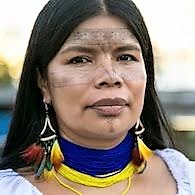Native women star in film

Patricia Gualinga is one of panelists to lead an online discussion and virtual release of a new feature documentary linking the environmental and climate justice efforts of four indigenous women in South and North American frontline communities at risk.
COURTESY / The Esperanza Project
GUADALAJARA – From The Esperanza Project, an independent multimedia outlet based in this Mexican metropolis, comes an online screening and film discussion July 1 of “The Condor & and the Eagle,” a new documentary linking the environmental and climate justice leadership of four indigenous women in South and North American frontline communities at risk.
The film took shape as spouses Sophie and Clément Guerra, of Germany and France respectively, set out on the road in North and South America to find, compile and share the stories of grassroots community activists in a production that has become a the keystone of a campaign to support native voices for Mother Nature.
After five years of offering their services, the filmmakers premiered the full-length documentary at the Woodstock Film Festival in New York State in October 2019. Selected by more than 50 film festivals across North America, “The Condor & the Eagle” since then has won 12 awards, including Best Documentary Film at the Red Nation International Film Festival in Beverly Hills.
The 2014 People’s Climate March in New York City, led by indigenous women from North and South America, convinced the Guerras to trace the relationships kindled there to their hometown roots.
The film’s storyline follows the protagonists from tar-sands fracked Athabascan neighborhoods, to the climate march, to oil pipeline impacted bayou communities in North America, then to Central and South American rainforests villages ravaged by mineral extraction, as they build a meaningful Panamerican alliance for resilience and sustainability.
Inspired by Ponca Casey Camp Horinek, a leader of the North-South (eagle-condor) movement, the film was set for international theater release just when the 2020 pandemic of coronavirus shut down movie houses everywhere.
The Esperanza Project and numerous other allies are picking up the slack by providing watch parties for groups to share the film and ideas it inspires in a virtual setting.
“As we work to prevent the spread of Covid-19, indigenous activists across North and South America continue to defend the lands and waters, and to protect their communities from extraction and the pandemic,” The Esperanza Project Founder Tracy Barnett said in issuing the screening invitation.
“The climate crisis is not paused while we battle Covid-19; we must support and learn from those at the front line of the struggle for climate justice.”
Partnering with the film directors, the Mexico-based production company Voices of Amerikua, and the climate justice group 350.org Guadalajara, The Esperanza Project has scheduled a live post-film online discussion for the event entitled “Defending the Defenders Of Mother Earth.” It will be led by prominent indigenous changemakers of Turtle Island.
Among them is Patricia Gualinga, a spokeswoman for many environmental projects, such as the indigenous-led proposal Kawsak Sacha, or Living Forest, which calls for legal protection of the Ecuadorian Amazon.
Gualinga works to protect the Kichwa People of Sarayaku community from human rights violations due to oil extraction projects by Chinese companies on their land.
Next up is Honduran social activist Bertha Zúñiga Cáceres, whose mother, Goldman Environmental Prize recipient Berta Cáceres, was murdered in 2016. Of Lenca descent, Zúñiga carries on the organizational work her parents initiated in defense of the environment and their people.
Another panelist is Moira Millán, a Mapuche weychafe (warrior) from Argentina, who is a leader of the indigenous ancestral lands recovery movement and the founder in 2000 of the Lof Pillán Mahuiza community.
In 2012, Millán began a series of meetings with women from different indigenous communities of Argentina, consolidating them in 2015 with the formation of the Movement of Indigenous Women for Good Living, which she coordinates. This movement, representing 36 native nations, convened the global Peoples Against Terricide Climate Camp, where the Peoples Against Terricide Movement emerged.
Topping off the program is film protagonist Yudith Nieto, a Mexican-American artist, organizer and language justice worker originally based in Houston, where she advocated for the people of the Manchester sacrifice zone, on the east end of Houston’s refinery district, in collaboration with Texas Environmental Justice Advocacy Services, TEJAS.
Nieto went on to organize in the Louisiana bayous as part of the core leadership circle for Another Gulf Is Possible. She works on community-led media, just transition stories, art in solidarity and direct action for decolonization.
Donations for the online showing and discussion will go to the organizing in the communities where these struggles are ongoing. Register here for the event at 6 p.m. Mountain Time.
(Contact Talli Nauman at talli.nauman@gmail.com)
